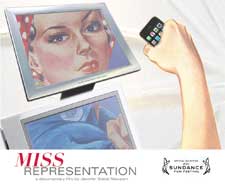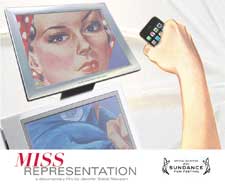 KINGSTON, R.I. – March 12, 2013 – It’s no surprise that one of the most popular reality shows on television is about the Kardashian sisters, who, some argue, value their looks more than their noggins.
KINGSTON, R.I. – March 12, 2013 – It’s no surprise that one of the most popular reality shows on television is about the Kardashian sisters, who, some argue, value their looks more than their noggins.
That portrayal of women as helpless and whining dolls is pervasive in our culture today and the disturbing message in a searing documentary to be shown Tuesday, March 19 at the University of Rhode Island.
“Miss Representation” is written, directed, and produced by Jennifer Siebel Newsom, a former actress-turned-filmmaker and the wife of California Lt. Gov. Gavin Newsom. Free and open to the public, the film – sponsored by the College of Human Science and Services – will start at 6 p.m. in the Agnes G. Doody Auditorium, Swan Hall.
The 2011 film was a hit at the Sundance Film Festival, with one reviewer praising it for revealing how the media objectify women and shape our culture to believe that a woman’s value lies in her youth, beauty, and sexuality, rather than in her strengths as a leader.
With stories from teenage girls, politicians, journalists, entertainers, activists and academics, the documentary explores the sexist coverage of female political candidates and shows how the media obsess with the appearances of women and largely ignore how men look. The problem is worsening with the rise in reality shows and the round-the-clock news cycle.
The film also confronts other issues plaguing women today, especially the younger ones: self-abuse, depression, teen pregnancy, domestic violence, date rape, and cosmetic surgery. But the film also offers positive steps on how women and girls can empower themselves to erase media stereotypes.
Speaker of the House Nancy Pelosi, former U.S. Secretary of State Hillary Clinton, television journalist Katie Couric, MSNBC commentator Rachel Maddow, comedienne Margaret Cho, and feminist Gloria Steinem are among the women interviewed in the 45-minute film, seen by thousands of students at colleges and universities throughout the country and even incorporated into high school curriculums in some California schools.
“I wanted to shed light on an issue that I felt was damaging our youth and our culture and that was being treated as a norm in our society,” Newsom has said. “I have always loved films with social meaning and significance.”
She cites abysmal statistics to show how backward the country is when it comes to gender equality: only 17 percent of Congressional members are women, and only 3 percent of Fortune 500 CEOs are women. Also, women make about 75 cents on a man’s dollar.
After the film, a panel talk will follow with three University faculty and administrators: Laura Beauvais, vice provost for academic affairs; Judith Swift, director of the Coastal Institute and a professor of communication studies and theater; and Shima Younes, a doctoral student in education. The talk is open to the public. Light refreshments will be served.
The discussion will focus, in part, on how to break down the cultural mindset to be more accepting of women leaders, how the media can more positively depict girls and women, and how to talk to girls and boys about gender stereotyping.
“The College of Human Science and Services is delighted to sponsor a screening of this documentary in honor of Women’s History Month,” said Lori Ciccomascolo, dean of HSS. “Although this film clearly depicts how girls and women are portrayed in contemporary media, it also provides action steps to empower girls and women to combat the negative effects of media.”
With more than 2,400 undergraduate students, 400 graduate students, and six academic departments, HSS is the second-largest college on campus, just behind the College of Arts and Sciences.
HSS is comprised of Communicative Disorders, Physical Therapy, Kinesiology, School of Education, Textiles, Fashion Merchandising and Design, Interdisciplinary Studies in Gerontology and Health Studies, and the Department of Human Development and Family Studies, which explores women’s issues.
Students study areas as diverse as textile chemistry, exercise science, speech and hearing, global health, and college student personnel, and they go on to work as designers, physical therapists, health care employees, and college deans.
For more information about the talk, please contact Anne Seitsinger, associate dean of HSS, at 401-874-4014 or anneseitsinger@uri.edu. For information about the film, please visit www.missrepresentation.org. The Agnes G. Doody Auditorium is in Swan Hall at 60 Upper College Road in Kingston.

